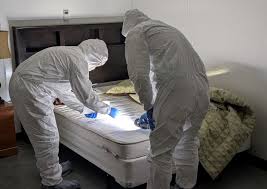Advanced Crime Scene Investigation Techniques Training Course
Advanced Crime Scene Investigation Techniques Training Course is designed for forensic professionals, law enforcement personnel, and investigative specialists who are determined to master modern, scientifically validated, and technology-driven crime scene procedures.

Course Overview
Advanced Crime Scene Investigation Techniques Training Course
Introduction
Advanced Crime Scene Investigation Techniques Training Course is designed for forensic professionals, law enforcement personnel, and investigative specialists who are determined to master modern, scientifically validated, and technology-driven crime scene procedures. This course emphasizes evidence-based practices, forensic innovation, and crime scene reconstruction to elevate the standards of investigation. With a rapidly evolving landscape in criminal investigation, professionals must stay ahead with the latest tools, digital forensics, and multidisciplinary approaches.
In this highly practical and immersive course, participants will engage with real-world scenarios, high-profile case studies, and interactive simulations. From biometric analysis to DNA profiling, and from ballistics assessment to trace evidence examination, this course arms learners with cutting-edge skills to solve complex cases. The training is ideal for professionals aiming to develop a meticulous and systematic approach to advanced crime scene investigations while integrating modern forensic science and criminal justice standards.
Course Objectives
- Understand advanced forensic evidence collection methods.
- Apply crime scene reconstruction techniques for accurate analysis.
- Master digital forensics and cybercrime investigation procedures.
- Implement biometric and DNA profiling strategies effectively.
- Analyze bloodstain patterns for reconstructive accuracy.
- Integrate 3D scanning and crime scene documentation technology.
- Employ latent fingerprint and trace evidence techniques.
- Enhance chain-of-custody and legal documentation skills.
- Use geospatial crime mapping tools for pattern analysis.
- Evaluate ballistics and toolmark evidence with forensic precision.
- Conduct post-blast and fire scene investigations using global protocols.
- Lead interdisciplinary investigation teams with best practices.
- Present courtroom-ready forensic reports and expert testimony.
Target Audiences
- Crime Scene Investigators
- Forensic Science Students
- Law Enforcement Officers
- Criminal Justice Professionals
- Private Investigators
- Prosecutors and Legal Experts
- Intelligence Analysts
- Military and Homeland Security Personnel
Course Duration: 5 days
Course Modules
Module 1: Forensic Foundations and Scene Security
- Introduction to crime scene integrity
- Role of first responders and securing the perimeter
- Identification and control of contamination risks
- Establishing a chain of custody
- Proper scene documentation techniques
- Case Study: Mismanaged Crime Scene – Lessons from the JonBenét Ramsey Investigation
Module 2: Advanced Evidence Collection Techniques
- Specialized tools for evidence collection
- Packaging, labeling, and preservation methods
- Biological, chemical, and physical evidence types
- Role of luminol and alternate light sources
- Quality assurance in evidence handling
- Case Study: The O.J. Simpson Case – Blood Evidence Controversies
Module 3: Bloodstain Pattern and Trajectory Analysis
- Types of bloodstain patterns and their meanings
- Area of origin and angle of impact
- Blood dynamics and velocity interpretation
- Shooting reconstruction basics
- Use of software tools for analysis
- Case Study: The Oscar Pistorius Case – Bloodstain Reconstruction
Module 4: Digital Forensics and Electronic Evidence
- Cybercrime scene protocols
- Retrieval and imaging of digital data
- Mobile phone and computer forensic techniques
- Social media footprint analysis
- Encryption and anti-forensic tactics
- Case Study: BTK Killer – Digital Metadata Breakthrough
Module 5: Trace Evidence and Microscopic Analysis
- Hair, fibers, glass, paint, and soil analysis
- Microscopy techniques and instrumentation
- Cross-transfer theory and Locard’s Principle
- SEM and FTIR technologies
- Contamination prevention techniques
- Case Study: The Atlanta Child Murders – Fiber Analysis Impact
Module 6: Firearms, Ballistics, and Toolmark Investigation
- Ballistic trajectory and gunshot residue testing
- Bullet comparison and caliber determination
- Toolmark identification principles
- Firearm database systems (e.g., IBIS)
- Muzzle-to-target distance estimation
- Case Study: JFK Assassination – Ballistics Revisited
Module 7: Fire and Explosion Scene Investigation
- Arson detection techniques
- Post-blast scene management
- Accelerant detection and analysis
- Scene reconstruction with fire patterns
- Coordination with bomb squads and fire marshals
- Case Study: Oklahoma City Bombing – Post-Blast Scene Processing
Module 8: Legal, Ethical, and Courtroom Forensics
- Expert witness training and report writing
- Legal admissibility of forensic evidence
- Ethical challenges in forensic reporting
- Mock court presentations and simulations
- Interaction with prosecutors and defense attorneys
- Case Study: The Casey Anthony Trial – Forensic Evidence Scrutiny
Training Methodology
- Interactive lectures with visual presentations
- Hands-on lab simulations and mock crime scenes
- Group activities and team-based problem-solving
- Analysis of real-world case studies
- Assessments, quizzes, and courtroom presentation practice
Register as a group from 3 participants for a Discount
Send us an email: [email protected] or call +254724527104
Certification
Upon successful completion of this training, participants will be issued with a globally- recognized certificate.
Tailor-Made Course
We also offer tailor-made courses based on your needs.
Key Notes
a. The participant must be conversant with English.
b. Upon completion of training the participant will be issued with an Authorized Training Certificate
c. Course duration is flexible and the contents can be modified to fit any number of days.
d. The course fee includes facilitation training materials, 2 coffee breaks, buffet lunch and A Certificate upon successful completion of Training.
e. One-year post-training support Consultation and Coaching provided after the course.
f. Payment should be done at least a week before commence of the training, to DATASTAT CONSULTANCY LTD account, as indicated in the invoice so as to enable us prepare better for you.